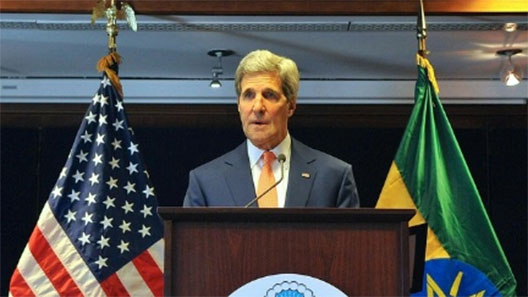 Secretary of State John Kerry ended an impromptu six-day tour of Africa yesterday, May 5. The trip was undertaken with little fanfare—the State Department announced the visit just a few days before his departure—and the Secretary’s activities received little attention from the press. (None of the five major American television networks even opted to send a camera crew along on the trip.)
Secretary of State John Kerry ended an impromptu six-day tour of Africa yesterday, May 5. The trip was undertaken with little fanfare—the State Department announced the visit just a few days before his departure—and the Secretary’s activities received little attention from the press. (None of the five major American television networks even opted to send a camera crew along on the trip.)
And yet Kerry’s whirlwind tour of Ethiopia (from April 29 to May 3, with a day-long sojourn to the war-ridden South Sudanese capital of Juba on May 2), the Democratic Republic of Congo (on May 4) and Angola (on May 4and 5) was the Secretary’s first meaningful visit to the African continent since he took office, and it was clearly intended to highlight Kerry’s thinking about U.S. policy towards Africa. While in the Ethiopian capital of Addis Ababa, Kerry delivered a major policy address on the Obama Administration’s “Commitment to Africa,” and he gave a considerable number of press conferences in which he took pains to make himself available to local reporters. Kerry also delivered an op-ed to the Washington Post to further clarify his position on Africa’s various opportunities and challenges.
Unfortunately, in the aftermath of the visit, it’s not entirely clear what message Kerry intended to send.
In the first place, the State Department announced a sprawling set of objectives for what was admittedly a last-minute detour to the African continent: to “encourage democratic development, promote respect for human rights, advance peace and security, engage with civil society and young African leaders who will shape the continent’s future, and promote trade, investment and development partnerships in Africa.” The casual observer might assume that these objectives were listed in order of priority.
And indeed, Kerry’s keynote policy address focused heavily, as expected, on the interdependence of democratic freedoms and economic growth:
But Kerry’s remarks were delivered, without any obvious sense of irony, in the bosom of one of Africa’s most repressive regimes, where nine journalists were at that moment being held incommunicado for the crime of associating with international human rights groups and where—during Kerry’s visit—some thirty students were gunned down while protesting the redistricting of Addis Ababa’s city limits.
Likewise, while Kerry’s formal remarks during his policy address dutifully emphasized the Obama Administration’s various aid and development efforts on the continent, including AIDS programming and the Power Africa initiative, and the Administration’s passion for promoting American investment in Africa, both the Secretary’s itinerary and his comments during his press conferences emphasized his passion for an old-school style of peacemaking. All of Kerry’s destination countries—Ethiopia, South Sudan, the Congo, and Angola—are either countries gripped by a terrible crisis, or countries leading the African response to those crises. The only comments of Kerry’s visit that generated even a temporary buzz in the American press were those surrounding the growing possibility of a “genocide” in South Sudan, and Kerry’s offer to provide assistance to locate the 230 schoolgirls taken hostage by Nigeria’s Boko Haram.
The crisis in South Sudan warrants the committed attention of U.S. officials, but Kerry’s passion for peacemaking constantly seemed to take the Secretary off-message. The ‘Africa is rising’ narrative of Kerry’s formal policy address and the Washington Post op-ed were consistently overshadowed by updates on the crisis in South Sudan. (China has extensive equities in South Sudan, but during his ongoing visits to Ethiopia, Nigeria, Kenya and Angola, Chinese Premier Li Keqiang’s has remained laser-focused on mutual economic concerns.)
By far the most press attention that Kerry received during his trip was generated by his comments on the growing possibility of a “genocide” occurring in South Sudan. The “genocide” warning was obviously unscripted: Kerry’s advisors would certainly have prevented his use of the term, which does not remotely apply to the situation in South Sudan. (Genocide is the targeted slaughter of a minority or persecuted ethnic group by a state or ethnic majority with far greater military power; in South Sudan, two privileged ethnic groups are exchanging atrocities, and perpetrating them with two armies that are relatively equal in strength). The sensationalism and inaccuracy of the statement is not likely to be lost on African audiences that were probably hoping, at long last, for more specific news about America’s investment plans.
By the end of Kerry’s visit, international audiences had become fixated – rightfully, and also at long last – on another old-school African horror story: the terrible atrocities being visited on the schoolgirls of Nigeria by Boko Haram. During the brief spotlight that was fixed on Secretary Kerry’s visit to Africa, it would have been in the United States’ interest to convince African audiences that Americans care about the continent’s economic development, as well. It’s another missed opportunity to send the kind of message Africans are waiting to hear.
Image: State.gov
